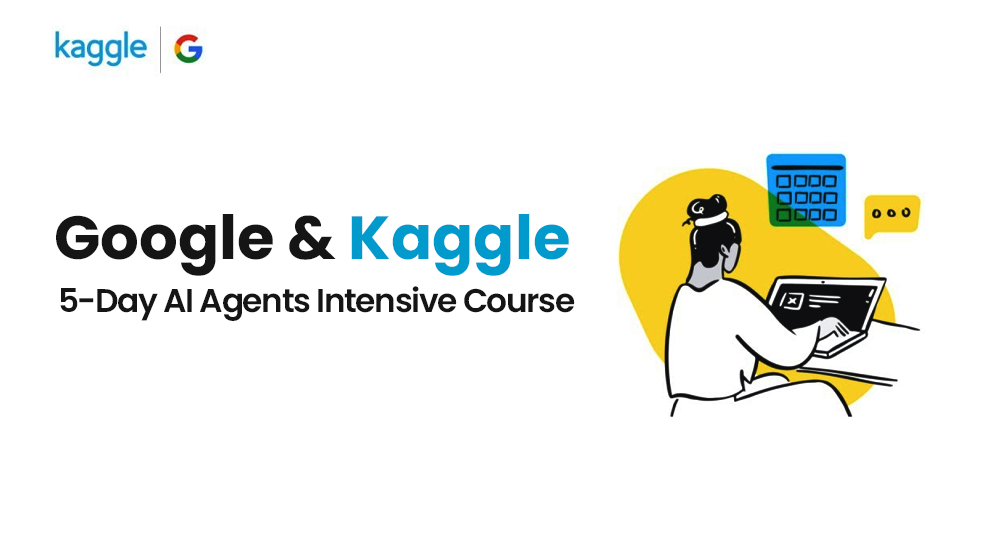In the rapidly evolving world of artificial intelligence, the shift from “model-calls” (just prompting a large language model) to full-fledged autonomous systems “agents” that plan, act, recall, evaluate, coordinate—is accelerating. Recognizing this trend, Google and Kaggle have launched the 5-Day AI Agents Intensive Course to help developers, data scientists and ML leaders leap into building the next generation of intelligent systems.
Whether you’re familiar with prompt engineering or you’re already shipping LLM-based apps, these intensive aims to give you hands-on exposure to agent architectures, tools, memory, evaluation and deployment—within a week-long schedule.
What is the Course?
- The course is online, runs over 5 days, scheduled November 10–14, 2025.
- It’s built by Google’s own AI engineers + researchers and delivered in partnership with Kaggle’s large community of learners.
- Its purpose: to take you from building simple “agents” to more advanced multi-agent systems; from prototype to production.
- Content will include deep-dives + hands-on codelabs + live discussions (via Discord/YouTube) + a capstone project where you apply what you’ve learned.
Why AI Agents Intensive Course Matters?
- “Agentic AI” (agents that act, plan, recall, call tools) is increasingly viewed as the next frontier beyond simply prompting large language models. As the Medium article puts it:
- For organisations and developers that want to build workflows, automations or systems where AI doesn’t just answer but does—this shift is significant. The course gives you the vocabulary, patterns, and hands-on skills to participate.
- With Google and Kaggle behind it, you also get access to their ecosystem, tooling, community and learning support.
Who Should Attend
This intensive is best suited for:
- Software engineers or data scientists who already know how to build small LLM-apps (chatbots, Q&A, retrieval) and now want to level-up to agents.
- Product or ML leads exploring agent-use cases (customer ops, content ops, analytics, security automations) and how to take them to production.
- Learners who are motivated to do hands-on work, engage with community (Discord livestreams) and build a capstone project.
Not quite the right fit if you’re brand-new to AI/ML—there is some assumed familiarity with LLMs, tools, Python notebooks etc.
What You’ll Learn & Week Structure
According to announcements, the schedule covers:
- Agent architectures: Single-agent vs multi-agent systems, how agents differ from traditional LLM uses.
- Tools & orchestration: How agents can call external tools/APIs, interoperate, use Model Context Protocol (MCP) etc.
- Memory & context engineering: How to design short-term and long-term memory so an agent can handle multi-turn tasks and recall what’s needed.
- Evaluation & observability: Logging, tracing, metrics, checking agent reliability, safety and performance.
- Prototype to production: Deployment, scaling, multi-agent coordination, operationalising agents for real-world use.
Day-by-day the learning will likely progress:
- Day 1: Foundations – what is an agent, how to frame your problem as an agent task.
- Day 2: Tools, API calls, orchestration.
- Day 3: Memory, context, multi-turn flows.
- Day 4: Evaluation, reliability, metrics.
- Day 5: Scaling, multi-agent systems, capstone & next steps.
How to Prepare
To get the most out of the course:
- Brush up on LLM-apps: Confirm you’re comfortable with Python (Jupyter/Colab), building simple retrieval/Q&A or bot systems.
- Pick a mini-use case: Start thinking of an automatable workflow in your domain (e.g., customer triage, content QA, support summarisation). Having a concrete problem makes the capstone much more valuable.
- Set up your dev environment: Have access to a Python notebook, APIs (OpenAI, Google, etc), familiarity with agent-frameworks/library (if possible).
- Think about success metrics: The course emphasises evaluation — “task completion rate, latency, human review time saved” etc. Pre-draft simple metrics for your workflow.
- Block your calendar for Nov 10-14: 5 full days of intensive work + live sessions — aim to devote meaningful time.
Benefits & Outcomes
If you fully engage, you should walk away with:
- A clear framework for designing agents (goal → plan → tool calls → memory → evaluation) rather than ad-hoc prompt engineering.
- Hands-on experience via codelabs and a capstone project—something you can show stakeholders or include in your portfolio.
- Insights into production considerations (logging, fallbacks, scaling) for agent-systems rather than just prototypes.
- A certificate of completion (depending on the offering) or at least a network/community via Kaggle & Google.
- A competitive edge: many organisations are still figuring out how to adopt agentic AI; you’ll have one of the earliest structured learnings in this domain.
Will the course provide a Kaggle certificate, medals, or points?
Every participant who completes the capstone project will receive a special badge on their Kaggle profile.
The capstone project will officially launch during the livestream on November 14th, 2025, offering you the chance to put your newly gained skills into practice. By taking part in this project, you’ll earn a badge that will be displayed on your Kaggle profile.
Moreover, the top 10 participants will win exclusive Kaggle swag and be highlighted on Kaggle and Google’s social media platforms to celebrate their success!
Cost, Format & Registration
- The course is free to register (via RSVP) though there may be prerequisites or capacity limits — register soon.
- Fully online: live broadcasts + community chat (Discord) + asynchronous codelabs.
- A capstone project is included; you may have the opportunity to win prizes and be featured on Google & Kaggle’s social channels.
Registration link: https://rsvp.withgoogle.com/events/google-ai-agents-intensive_2025
Why You Should (or Shouldn’t) Join
You should join if:
- You already have some AI/ML/LLM-experience and want to level-up into agents.
- You’re working in a domain where autonomous workflows or multi-step tasks are relevant (support automation, content operations, analytics, security).
- You’re ready to commit the time and engage with hands-on work + live sessions.
- You want to build a concrete project you can present or use within your organisation.
You might skip or wait if:
- You’re brand-new to AI/ML and still learning basic LLM usage; you might find the pace rapid.
- You’re unable to commit multiple hours per day during Nov 10-14.
- You’re not currently in a role or project where agent-based workflows are relevant (though you could still join for future readiness).
Tips to Get the Most Out of It
- Join the Discord/community early to network, ask questions, and see what others are doing.
- Arrive Day 1 with your use-case sketch: even a small problem will help you move faster.
- Focus on evaluation early—as the course emphasises, building something is one thing; proving it works reliably is what matters.
- Don’t over-design your capstone. A narrow, end-to-end prototype beats a half-baked wide one.
- After the course, reflect on how you’ll integrate the agent into your domain: monitoring, logging, drift, fallbacks. These are what production systems live or die on.
- Leverage the certification/recognition and showcase your capstone in your portfolio or LinkedIn — clearly noting you completed the “AI Agents Intensive” by Google + Kaggle.
Final Thoughts
The 5-Day AI Agents Intensive Course by Google and Kaggle is a timely, rigorous opportunity for developers and ML practitioners to pivot from “LLM apps” to “agentic systems.” As AI moves from suggestion to action, those who understand how to build agents — with memory, tools, coordination, evaluation and deployment — will be well positioned.
If you have access, some background in AI, and a real-world use-case in mind, this is one of the best short-form deep-dives available in late 2025. Block your calendar, register early, and come prepared to build.






What do you think?
It is nice to know your opinion. Leave a comment.